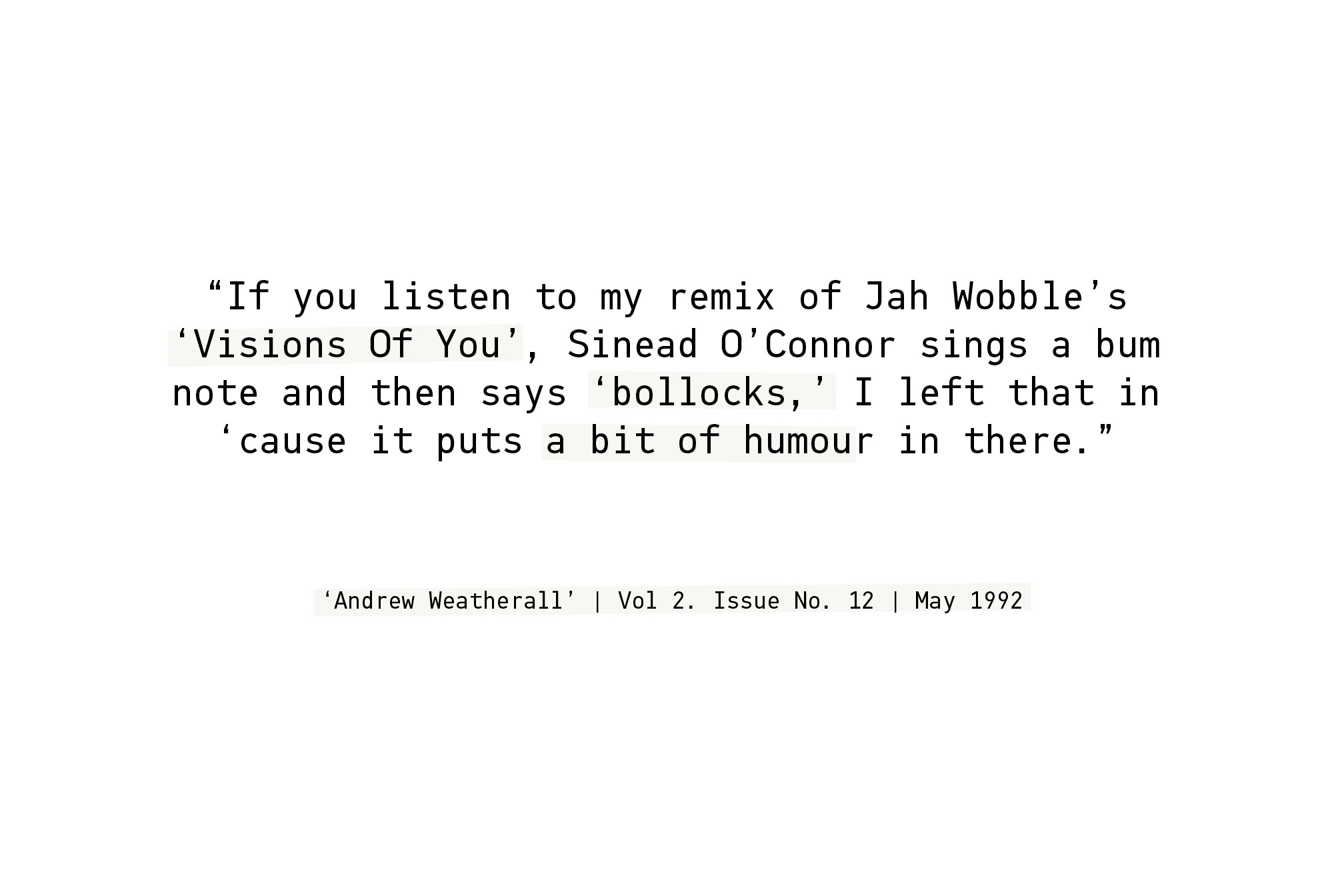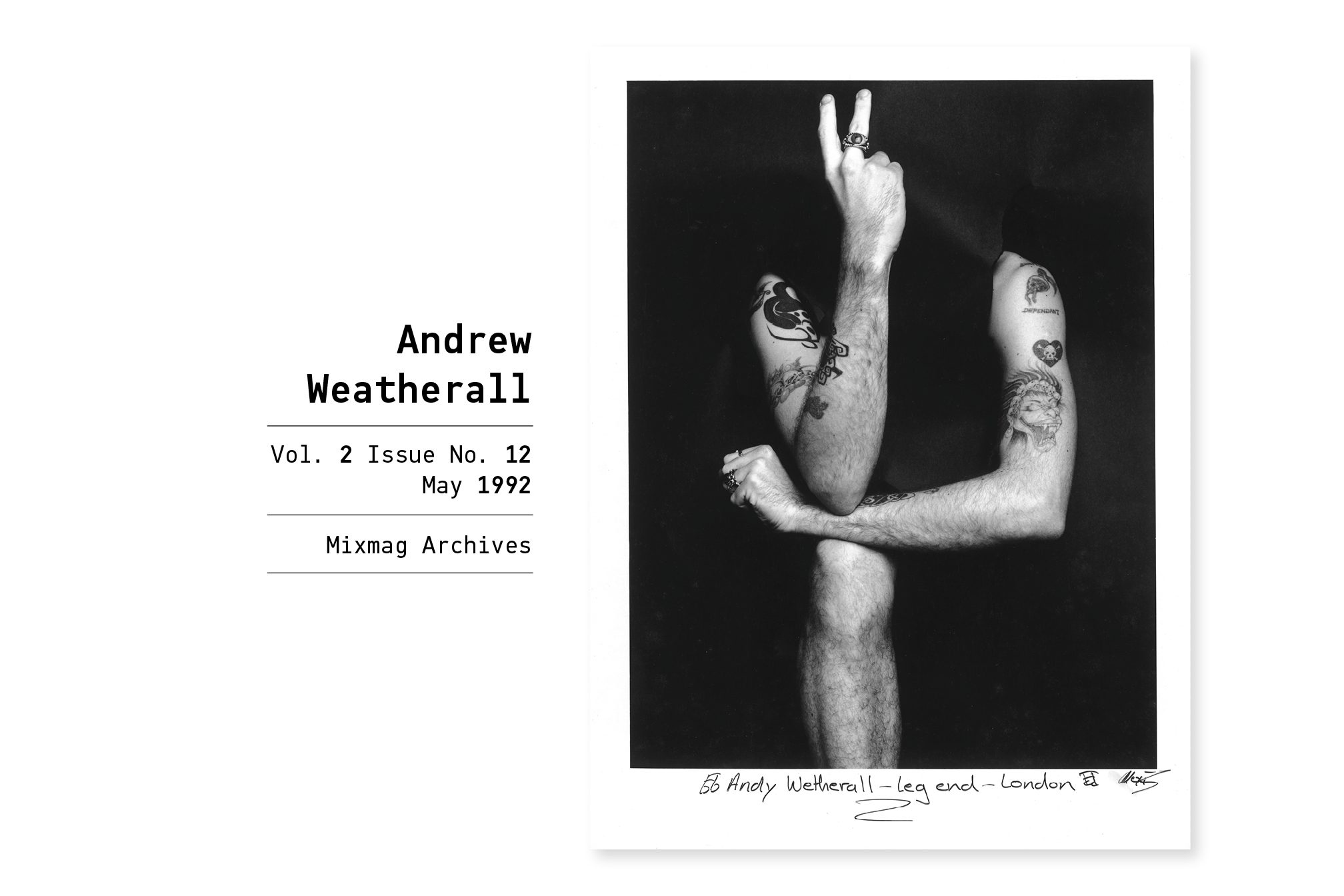 Artists
Artists
Andrew Weatherall: "I left Sinead O'Connor saying 'bollocks' in a remix because it added humour"
Andrew Weatherall was rigorously independent and loaded with attitude, as this classic feature from 1992 proves
In this classic feature from 1992, Mandi James meets one of the UK's hottest DJs in Andrew Weatherall, who provided typical anti-establishment chat and sat for an iconic portrait by Alexis Maryon
When Andrew Weatherall was fourteen, he'd wander round with a hand-held cassette recorder playing David Bowie's 'Rock 'n' Roll Suicide' over and over again. "Bowie really inspired me. It was like if ever you need evidence for not being normal then here it is, this is what it's all about. I was always gutted though because I had curly hair and couldn't get a feather cut."
When Andrew Weatherall was fourteen he was going to soul weekenders and all nighters. Even though he found the music ‘a bit wet', he liked the social side of it and would go home to listen to his Bolan and Led Zeppelin records. "Then I saw the Sex Pistols and that was it. Punk was supposed to break down all the barriers and for a while it did, it really inspired me, but eventually all it did was create a new set of rules. That's what's happened now. Where it was supposed to be wear what you want, listen to what you like, do what you like - that whole club thing has set up a new set of rules. The length of your hair now denotes how long you've been on the scene, it's worn like a badge, I know people need a sense of identity but surely..."
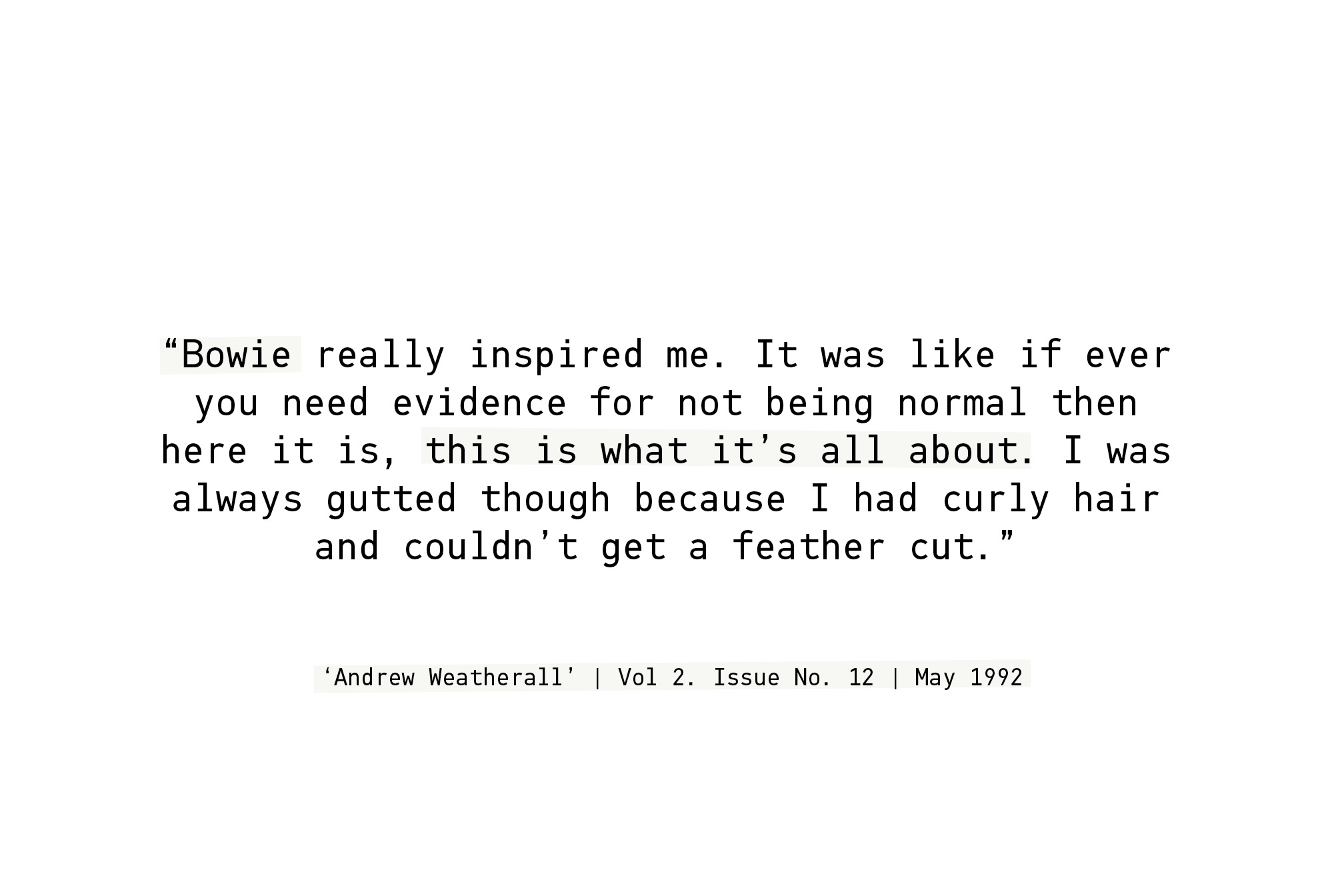
As one of the country's finest DJs, Andrew Weatherall's reputation rests on the fact that, as cliche as it sounds, he's never sold-out. He's always refused to compromise his eclectic style and he's long championed his catholic taste and unerring devotion to maverick music. Operating a strict policy of sticking to absolutely no policy, one night he could be celebrating roots and culture in a dub stylee, the next night acid flashback and trance dancing. Weatherall's selection is a strange brew but rarely routine. "Some people say I'm fickle," laughs Weatherall. “But it's not that I get bored, it's just that there's so much good stuff to explore. Music goes in waves and whatever I play is just a reflection of what I think's good at the time, that's why it changes and I go through phases. If I've been out and bought a load of good techno records I'll play them, then something else will come along. It's not fickle, it's just new."
Before becoming embroiled in the club circuit, Weatherall had started off DJing the way most do, playing “just parties and stuff like that, nothing too spectacular." His fortunes changed when his life did and he picked up on and became swept along by the politics of dancing.
"I got into it purely because of The Trip at the Astoria and then I started going to Shoom. I went to a party one night and got talking to Danny Rampling, spent the whole evening just chatting about music, then went down the club and played some to him. He couldn't believe what I was playing, he'd never heard anything like it and asked me to come down and play at the Shoom. So I started off immediately playing at the best club in the country if not in Europe, the club that theoretically started everything. The whole thing, that and the remixing has been all about lucky breaks, really lucky - otherwise I'd have been plodding away for fucking ages."
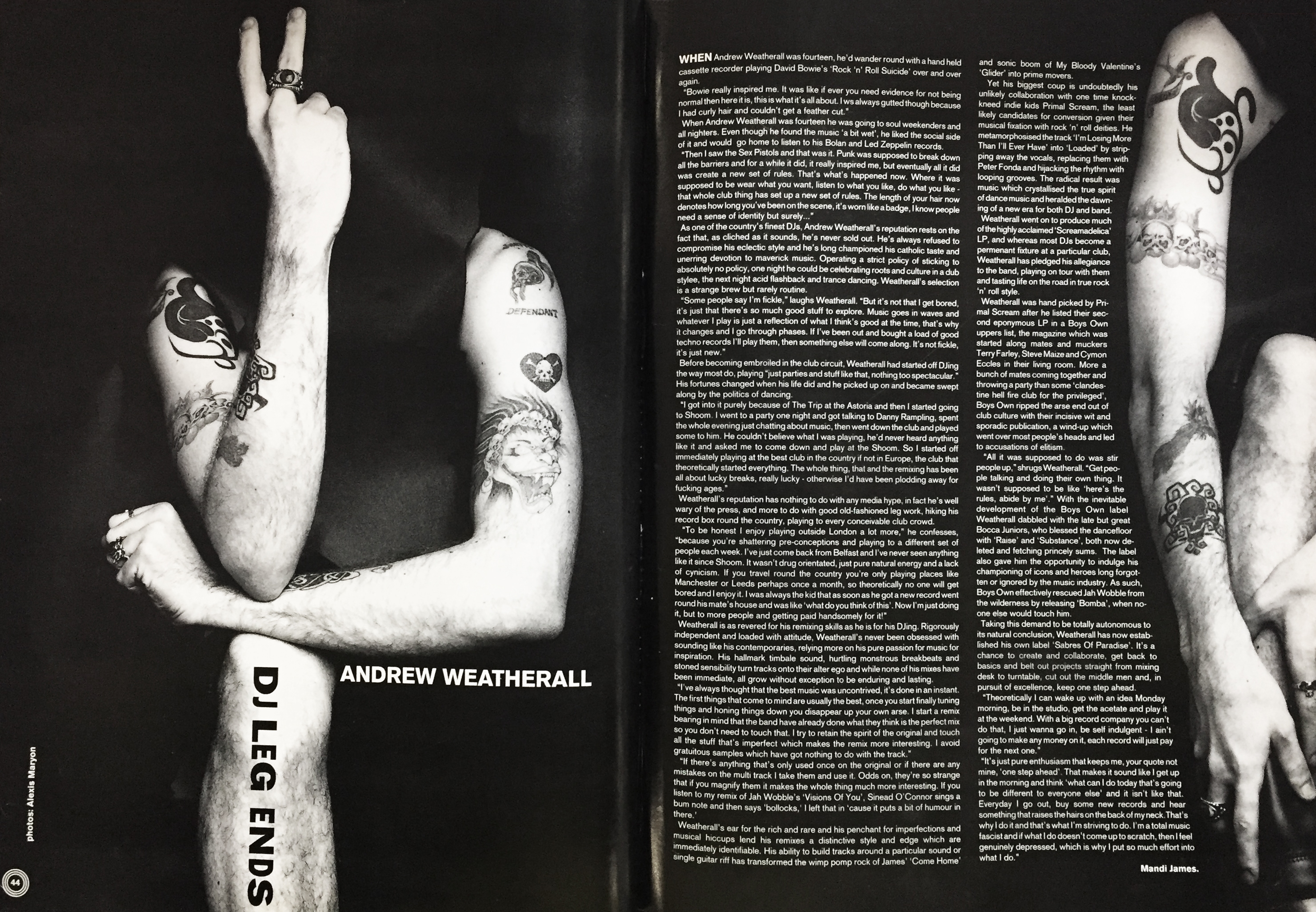
Weatherall's reputation has nothing to do with any media hype, in fact he's well wary of the press, and more to do with good old-fashioned leg work, hiking his record box round the country, playing to every conceivable club crowd. "To be honest I enjoy playing outside London a lot more," he confesses, “because you're shattering pre-conceptions and playing to a different set of people each week. I've just come back from Belfast and I've never seen anything like it since Shoom. It wasn't drug orientated, just pure natural energy and a lack of cynicism. If you travel round the country you're only playing places like Manchester or Leeds perhaps once a month, so theoretically no one will get bored and l enjoy it. I was always the kid that as soon as he got a new record went round his mate's house and was like 'what do you think of this'. Now I'm just doing it, but to more people and getting paid handsomely for it!"
Weatherall is as revered for his remixing skills as he is for his DJing. Rigorously independent and loaded with attitude, Weatherall's never been obsessed with sounding like his contemporaries, relying more on his pure passion for music for inspiration. His hallmark timbale sound, hurtling monstrous breakbeats and stoned sensibility turn tracks onto their alter ego and while none of his mixes have been immediate, all grow without exception to be enduring and lasting.
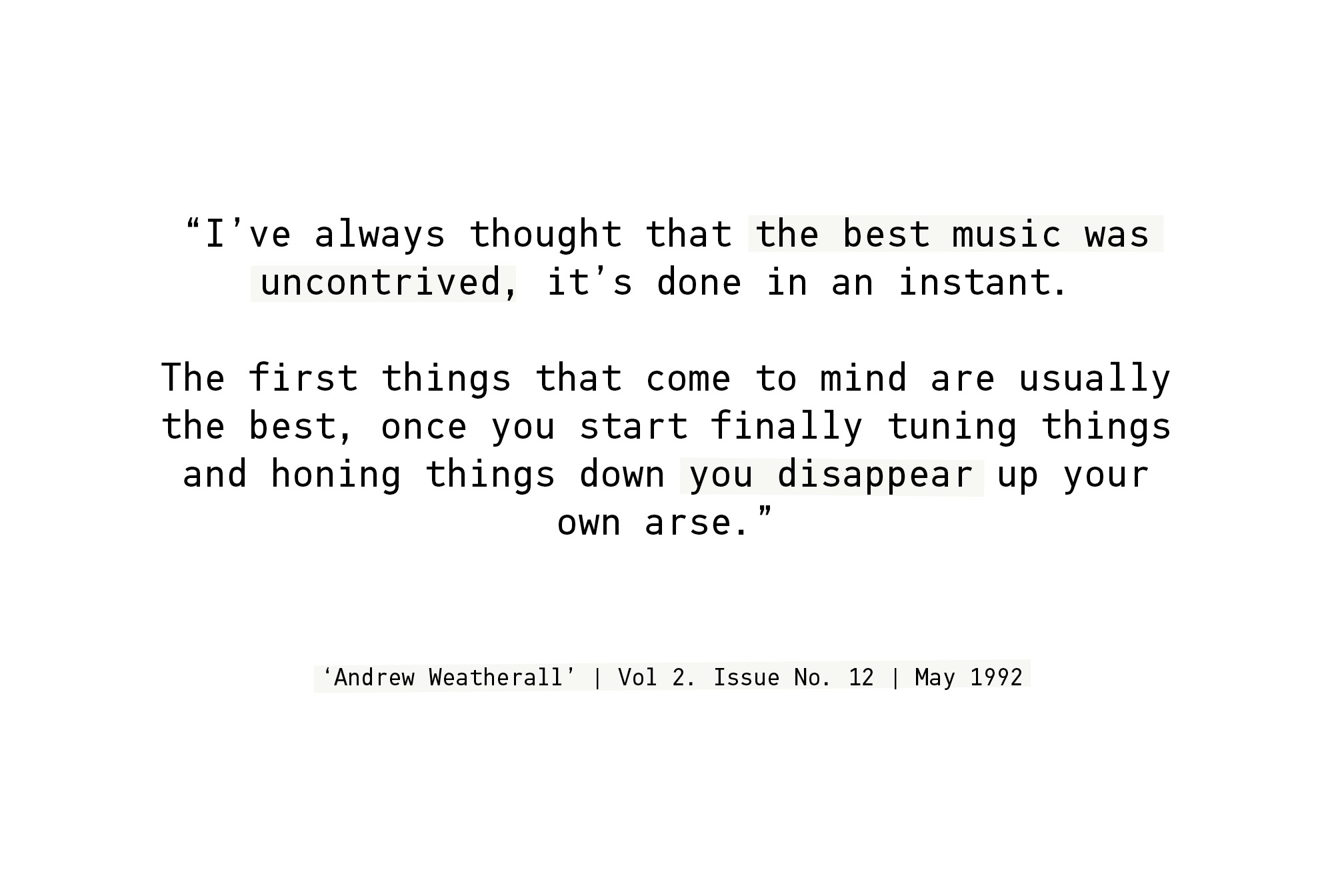
"I've always thought that the best music was uncontrived, it's done in an instant. The first things that come to mind are usually the best, once you start finally tuning things and honing things down you disappear up your own arse. I start a remix bearing in mind that the band have already done what they think is the perfect mix so you don't need to touch that. I try to retain the spirit of the original and touch all the stuff that's imperfect which makes the remix more interesting. I avoid gratuitous samples which have got nothing to do with the track."
"If there's anything that's only used once on the original or if there are any mistakes on the multi track I take them and use it. Odds on, they're so strange that if you magnify them it makes the whole thing much more interesting. If you listen to my remix of Jah Wobble's 'Visions Of You', Sinead O'Connor sings a bum note and then says 'bollocks,' I left that in 'cause it puts a bit of humour in there."
Weatherall’s ear for the rich and rare and his penchant for imperfections and musical hiccups lend his remixes a distinctive style and edge which are immediately identifiable. His ability to build tracks around a particular sound or single guitar riff has transformed the wimp pomp rock of James' ‘Come Home’ and sonic boom of My Bloody Valentine’s ‘Glider’ into prime movers.
Yet his biggest coup is undoubtedly his unlikely collaboration with one time knock-kneed indie kids Primal Scream, the least likely candidates for conversion given their musical fixation with rock 'n' roll deities. He metamorphosised the track ‘I'm Losing More Than I'll Ever Have' into ‘Loaded' by stripping away the vocals, replacing them with Peter Fonda and hijacking the rhythm with looping grooves. The radical result was music which crystallised the true spirit of dance music and heralded the dawning of a new era for both DJ and band. Weatherall went on to produce much of the highly acclaimed 'Screamadelica' LP, and whereas most DJs become a permanent fixture at a particular club, Weatherall has pledged his allegiance to the band, playing on tour with them and tasting life on the road in true rock 'n' roll style.

Weatherall was hand picked by Primal Scream after he listed their second eponymous LP in a Boys Own uppers list, the magazine which was started along mates and muckers Terry Farley, Steve Maize and Cymon Eccles in their living room. More a bunch of mates coming together and throwing a party than some 'clandestine hell fire club for the privileged’, Boys Own ripped the arse end out of club culture with their incisive wit and sporadic publication, a wind-up which went over most people's heads and led to accusations of elitism.
“All it was supposed to do was stir people up," shrugs Weatherall. “Get people talking and doing their own thing. It wasn't supposed to be like 'here's the rules, abide by me'." With the inevitable development of the Boys Own label Weatherall dabbled with the late but great Bocca Juniors, who blessed the dancefloor with 'Raise' and 'Substance', both now deleted and fetching princely sums. The label also gave him the opportunity to indulge his championing of icons and heroes long forgotten or ignored by the music industry. As such, Boys Own effectively rescued Jah Wobble from the wilderness by releasing 'Bomba', when no-one else would touch him.
Taking this demand to be totally autonomous to its natural conclusion, Weatherall has now established his own label 'Sabres Of Paradise'. It's a chance to create and collaborate, get back to basics and belt out projects straight from mixing desk to turntable, cut out the middle men and, in pursuit of excellence, keep one step ahead.
"Theoretically I can wake up with an idea Monday morning, be in the studio, get the acetate and play it at the weekend. With a big record company you can't do that, I just wanna go in, be self indulgent - I ain't going to make any money on it, each record will just pay for the next one."
"It's just pure enthusiasm that keeps me, your quote not mine, 'one step ahead'. That makes it sound like l get up in the morning and think 'what can I do today that's going to be different to everyone else' and it isn't like that. Everyday I go out, buy some new records and hear something that raises the hairs on the back of my neck. That's why I do it and that's what I'm striving to do. I'm a total music fascist and if what I do doesn't come up to scratch, then I feel genuinely depressed, which is why I put so much effort into what I do."
